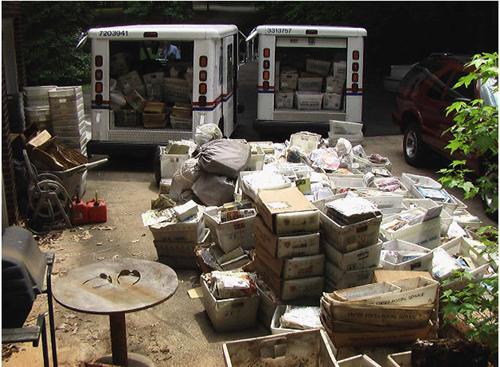Mail-hoarding carriers uncommon but embarrassing

In this undated photo released by the U.S. Postal Service, undelivered third-class mail is shown at the home of Steven Padgett, 59, a postal carrier who delivered in the Apex, N.C., area. The Associated Press
Jan 21, 2009
DETROIT – Some of the workers who are supposed to endure snow, rain and gloom of night to deliver the mail have resorted to hiding tons of it in garages, a self-storage unit and the dark of their basements.
Carriers from North Dakota to North Carolina have been hauled in recently for hoarding mail. Though the U.S. Postal Service says the offense is rare, it smacks at the agency’s image.
“I heard a couple of people come in and say, ‘Can I pick up my mail – or is it in storage?'” said Annette Koss, the postmaster in Howell, 50 miles northwest of Detroit. A former carrier there, Jill Hull, pleaded guilty Tuesday to deserting the mail, a misdemeanor.
The part-time, fill-in carrier had kept thousands of pieces of unopened mail, including 988 first-class letters, in a self-storage unit that managers opened in September after she failed to pay her bill. Some of the mail had postmarks from 2005.
“We just didn’t understand it,” Koss said. “It’s such a stupid thing to do.”
Get The Daily Illini in your inbox!
During a brief hearing in federal court in Detroit, Hull simply said, “I was unable to deliver all the mail.” A postal investigator said in a court filing that Hull had intended to catch up with late payments and apparently keep the mail under lock and keyindefinitely.
No one on the rural route had complained about missing any mail.
“Looking back at her time sheets, she was leaving early everyday,” said Koss, who became postmaster shortly after the discovery. “It’s like it got dark and she didn’t know what to do with the mail.”
Hull, 34, and her attorney had no comment after the guilty plea. The maximum penalty is a year in prison, but Hull is hoping for probation.
The Postal Service says there were 333 cases of theft, delay or destruction of mail by employees or contractors filed in the fiscal year that ended Sept. 30.
Some involve just a single piece of mail, such as money or gift cards taken from an envelope. A California postal manager was sentenced to 18 months in prison for stealing thousands of DVDs.
More than 600,000 postal employees in March received a reminder in their pay statement that delaying, stealing or throwing away mail is a crime. “You don’t have to be a genius to know,” it said with an image of Albert Einstein.
“It’s not a systemic issue; the majority of employees are hardworking and honest,” said Agapi Doulaveris, spokeswoman for the Postal Service’s internal investigators.
Postal Service spokesman Gerry McKiernan said steadily decreasing mail volume – down by 9 billion pieces in the last fiscal year – and route changes should help alleviate any stress felt by carriers.
In North Dakota, prosecutors will recommend probation for Allen Prochnow, 62, when he is sentenced in March for delaying and destroying mail. Four tons of mail – up to 10 years old – was removed from his house in Wahpeton, including 3,000 pieces of first-class mail.
“He’d see a magazine he’d like to read and pretty soon it was quite a bit of mail,” defense lawyer John Goff said. “A lot of it was piled neatly along walls in the house. In his own mind he was building a bunker. … His most frequent answer has been, ‘I don’t know why.'”
A tip from a meter reader led authorities last year to the home of Steven Padgett, 59, a carrier who delivered in the Apex, N.C., area. Authorities used four trucks to remove third-class mail that had been stashed in his garage for six years.
Padgett felt “it was almost a relief to get caught,” defense lawyer Andrew McCoppin said in a court filing.
“He denied that it stemmed from an anti-junk mail moral protest. It seems more likely that this man … could not admit to himself or his employer that he was beginning to have difficulty getting the job done,” McCoppin said.
Padgett was placed on probation and fined $3,000 – a penalty that was mostly paid by MailChimp, an Atlanta company that specializes in marketing through e-mail, not traditional mail.
“We’re doing everything we can to stop junk mail. We can relate” with Padgett, said co-founder Ben Chestnut, tongue-in-cheek.





